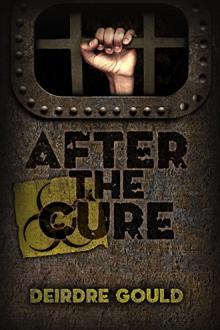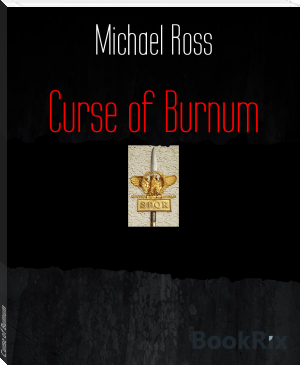After the Cure by Deirdre Gould (top ten books of all time .txt) 📖

- Author: Deirdre Gould
- Performer: -
Book online «After the Cure by Deirdre Gould (top ten books of all time .txt) 📖». Author Deirdre Gould
“Is she ever sedated?”
“She has to be to sleep, otherwise she just wanders all night until she collapses. But Mr. Grant, her lawyer, said he doesn’t want her drugged for the trial, so we only administer a very small dose of sedative at night.”
“Thanks,” said Nella as Johnson left the cell. Ann was holding the carrot with hands so thickly bandaged that they were no more articulated than wool mittens.
“Ann, do you know why you are in here?”
“Because the teeth must gnash. Because Dr. Schneider made all the teeth gnash. But I didn’t know! I only wanted to feel better. I didn’t know the teeth would want more!” Ann became frantic, smashing her hands into her face. Nella gently held Ann’s hands for a moment and then handed her another carrot. She tried not to think of how similar the crunch of bone and the damp snap, snap, snap of the carrot between Ann’s tireless teeth sounded.
“Can you tell me what happened? Do you remember how this started?”
Ann’s teeth stopped. “So tired, so tired. But the eyes must see, they cannot close. They can never close! Dr. Schneider says so, she says to stay and to see. Always the eyes must see.”
Ann paused to chew on the carrot and Nella winced without meaning to. “But then, they are so heavy, the eyes. Like glass marbles, rolling and rolling and scratching. They ache to close and Ann has mist inside her head. So Dr. Schneider gives her a key. It’s the special key for the beast door. Dr. Schneider tells her the beast room will turn her eyes to flesh again. Her eyes will see without closing and the mist will drain from Ann’s head, but only if Ann stays in the beast room. Only if Ann breathes what the beasts breathe. So Ann goes into the beast room many times. And she makes the teeth that gnash. She makes them everywhere but does not know. No, not even when they fill her own mouth.” Ann stuck her bandaged hand between her teeth and before Nella could jump up to stop her, Ann’s jaws snapped around it. Ann’s eyes streamed with tears as her mouth ground down upon the thick pads of gauze near her fingertips. Nella gently pulled Ann’s hand away from her mouth and replaced it with another carrot.
“Okay Ann, okay. We don’t have to talk more about it today.”
Nella checked Ann’s hand and rebandaged it. Ann became calm again, her gaze again like oil, sliding over the room and Dr. Rider without pause. Nella gently replaced the arms of the straitjacket but Ann didn’t even seem to notice.
“Goodbye Ann. I’ll come and see you again soon. Maybe we can get you out of this room for a while. Would you like that?”
But Ann just resumed her restless stumbling around the perimeter of the cell. She didn’t even turn her head to look at the doctor. Nella left the cell profoundly depressed.
Sevita
Nella made her way back toward the entrance of the prison. She felt drained and uneasy, as if she’d forgotten something important or as if she had exhausted every possibility to an unsolvable problem. She groaned inwardly when she reached the heavy glass doors and saw that the sleet had changed over to snow and was already thick on the pavement. Nella hated this in between time of year. As if the old wheezing world couldn’t decide whether to finally die or rally itself for one more spring.
She pushed open the door and slipped into the slimy, chilled evening. Her car was the only one in visitor parking. It wasn’t unusual. Most people were used to being alone now. Gas was reserved for critical purposes at least until the Farm could produce enough ethanol or the Cure spread far enough south to recover countries with oil fields. Nella doubted either would happen in her lifetime. Only the counsel for the defendants and herself would have vehicles here. The loneliness seeped in everywhere these days, part of the atmosphere and only rarely noticeable. Now, with the small circles of streetlight hovering over her and the extra silence of the snow, she felt it again, like a sudden stumble on a forgotten stair. Nella walked toward her car and suddenly realized that the vehicle had been cleared of snow. She smiled and looked around as if her helper would suddenly pop out. She drove home feeling a little better about the world.
Her good mood lasted until she saw the envelope from the Department of Human Reproductive Services in her mail box. Nella swore under her breath, but didn’t bother to open it. Instead, she dropped it on her kitchen table and went to call Sevita.
The two had remained together after the first administration of the Cure. Sevita had been offered a position on the World News Broadcast as soon as her report with Dr. Rider had been aired, but she had refused the job. Sevita was drawn to the stories of the Cured as they looked for relatives or tried to come to terms with the violence they remembered committing. She documented the work of Nella’s team for six years as they pushed farther and farther into the infection zones along with the military. As a result, both women had become best friends. Sevita had been selected to document the Plague Trial just months before Judge Hawkins had appointed Nella the chief psychiatric adviser.
The phone only rang for a second before Sevita answered.
“Guess what I got in the mail today?” said Nella, before they had even exchanged greetings.
“You too huh? Seems our friendly neighborhood matchmakers have been busy. Our entire unit got them today.”
“What are you going to do? Have you told Chris yet?”
Sevita sighed. “Yeah, she knows. She’s excited. I think she sees it as the final blow in the marriage argument. She doesn’t know I was going to ask her after the trial anyway.”
“Sure you were.”
“I was! I just wanted to have all this behind us. I don’t want to remember the year our baby was born as the year the first public executions took place.”
“You don’t know that’s what will happen.”
“Come on Nella, I know you aren’t that naive. Whether this Dr. Pazzo and his assistant are guilty or not doesn’t really make much difference, does it? They were there. The survivors of the Plague think they’ve seen the worst. But you and I, we’re the ones who know how much damage has really been done. You’ve talked with the Cured, been with them from the moment they realized the weight of what they had done. You know the suicide rates. You were the one that compiled the report. Once all that comes out in court, the world is not going to be able to let go. Maybe just being there is close enough to guilty.”
“Then what’s the point of even having the trial Sevita? Why didn’t the military just shoot them when they found them? They wouldn’t have bothered appointing you to document it if we weren’t going to try to have real justice.”
“We’re just pretenses, you and I, to make it seem like a fair trial. Whatever you find, the trial will still move forward. Whatever I record will be rewritten. And Pazzo and Connelly will burn. I just hope for our sakes that they really are guilty.”
Nella was quiet. “I don’t want to talk about it anymore,” she said at last.
“Neither do I. There’s nothing you or I can do to change it. So come over for dinner. We’ll talk about baby clothes and nursery designs with Christine. She’ll be ecstatic. She brought home a case of beer from her last scav mission as part of her pay.”
“Mmm eight year old beer.”
Sevita laughed. “We have to drink it tonight, she wants to have the fertilization done this week.”
“You aren’t going to adopt an orphan?”
“No, Christine is set on the pregnancy. She says we all have a ‘genetic responsibility’ now. I think she’s been reading too many DHRS pamphlets. But this is what she wants. And you know I can never resist it when she sets her heart on something. Come on, come over. I know you’ll fall asleep over your notes without eating if you don’t. No trial talk, I promise.”
“Okay,” said Nella, grinning, “I’ll be over in a few.”
Sevita and Christine had met during the worst part of the Plague, long before either knew Nella. Christine had been an EMT when the outbreak began. She found out quickly that she was immune to the December Plague, though her partner was not so lucky. So Christine drove her ambulance alone, ferrying the Infected to local hospitals until the military took over management and burned them all to the ground. After that, Christine ran a mobile triage out of her ambulance for those who had been bitten or injured. The world quickly emptied of sanity and Christine had to routinely defend herself both from Infected and desperate people. But she never thought about quitting. She kept her radio on at every hour and kept her ambulance clean, running and well-stocked when she had time. The military tolerated her, even supplied her with fuel and medical supplies but warned her that she was on her own. And that was just fine with Christine. But when she heard repeated distress calls from Sevita’s office, she followed a military unit in to help. The entire building had been surrounded by Infected. But because it was one of the few remaining stations still capable of broadcasting, the military decided it was a worthwhile target to retake. It was a massacre. When they finally escaped, the building was overrun and most of the military unit had been eaten alive. Only four people remained, huddled in Christine’s ambulance as they sped away. Sevita was one of them.
Sevita had been wounded in several places trying to defend her coworkers. Christine had stopped driving her ambulance in order to care for the dying girl and eventually nursed her back to health. But Sevita clung to Chris long after she had healed, uncharacteristically afraid of the strange city and mistrusting of its thinly manned safety barriers. Nella never understood how two such opposite people could be so madly in love with each other, but there it was. They’d been inseparable as long as she had known them- since Sevita’s arrival in the City. Though Sevita regained her bold, friendly nature, neither she nor Christine ever felt the need to look any farther for their happiness.
Most of the remaining humans had kept to themselves after the Cure. Everyone had witnessed or participated in the death of almost every person that they knew. Even eight years after the Plague, almost no one had any real urge to build new ties. Especially after the old ones had been so brutally broken. In the beginning, people had avoided each other as much as possible for their own safety. Now though, it had become habit. Love like Sevita and Chris had just didn’t





Comments (0)